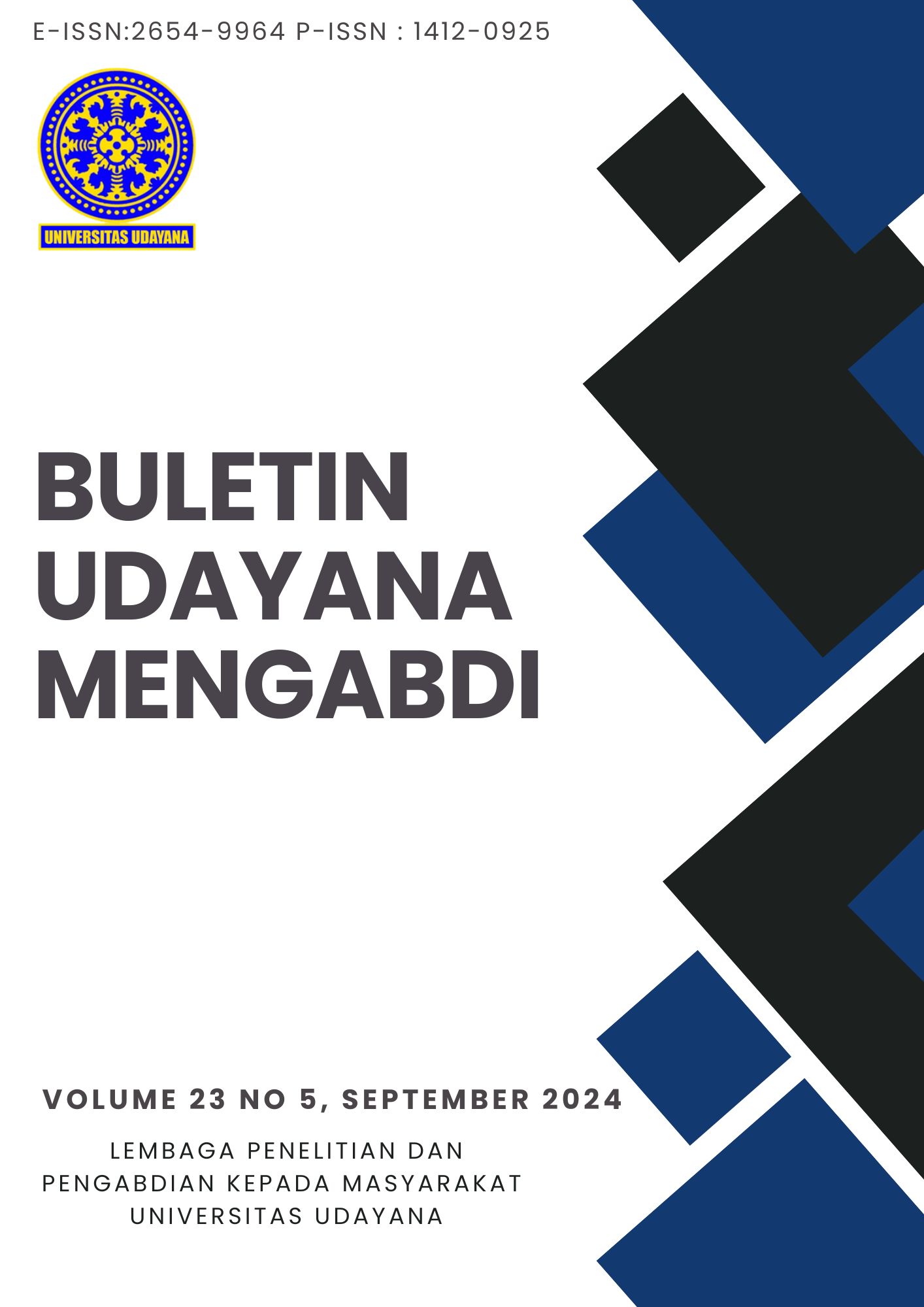PENINGKATAN PRODUKTIVITAS IKAN NILA (Oreochromis niloticus) MELALUI TEKNOLOGI BIOFLOK
Abstract
The productivity of tilapia is influenced by the rate of growth of fish and the dilution of fish, as well as the feed used during the cultivation process. The use of biofloc techniques greatly affects the growth rate and dilution of fish and can reduce feed costs. Biofloc is composed of floc-forming microorganisms that utilize feed residues and fish feces so that they become natural feed with the help of decomposing bacteria. The use of biofloc can increase fish growth because biofloc can provide natural feed. Such additional (natural) feed has a protein source that serves to increase the growth of farmed fish. In addition, to feed, an important thing to increase the productivity of tilapia is disease prevention. This activity has been carried out on Saturday, August 13, 2022 at the Mina Tirta Pertiwi Pokdakan, Gunung Salak Village, East Selemadeg District, Tabanan. This activity was attended by group members, Fisheries Extension Officers from the Fisheries Service of Tabanan Regency, service teams and resource persons as well as students. This service activity has been carried out well and the team aided in the form of tilapia fry and tools and materials for making biofloc. The hope of this activity is that group members continue to apply the knowledge that has been obtained so that they can increase the production of tilapia.
Keywords: Biofloc, Aquaculture, Tilapia, Prebiotic
Downloads
References
Faridah, Selvie D., dan Yuniati. 2019. Budidaya Ikan Lele dengan Metode Bioflok pada Peternakan Ikan Lele Konvesional. Jurnal Pengabdian Kepada Masyarakat, 1(2): 224-227.
Hermawan, T.E.S.A., Sudaryono A., dan Prayitno S.B. 2014. Pengaruh padat tebar berbeda terhadap pertumbuhan dan kelulushidupan benih lele (Clarias sp.) dalam media biflok. Journal Of Aquaculture Management and Technology, 3(3): 35-42.
Maesaroh. 2013. Analisis Filogenetika Isolat Aeromonas hydrophila Dari Ikan Sehat Menggunakan Gen 16s rRNA. [Skripsi]. Bandung: Universitas Pendidikan Indonesia.
Purnomo, P.D. 2012. Pengaruh Penambahan Karbohidrat Pada Media Pemeliharaan Terhadap Produksi Budidaya Intensif Nila (Oreochromis niloticus). Journal of Aquaculture Management and Technology, 1(1): 161-179.
Shofura, H., Suminto dan Diana, C. 2016. Pengaruh Penambahan “Probio-7” Pada Pakan Buatan Terhadap Efisiensi Pemanfaatan Pakan, Pertumbuhan Dan Kelulushidupan Benih Ikan Nila Gift (Oreochromis niloticus). Jurnal Sains Akuakultur Tropis, 1(1):10-20.
Susanto, H. 2015. Budidaya 25 Ikan di Pekarangan. Jakarta: Penebar Swadaya. 220 hlm.
Yulianingrum, T., Nikem A.P., dan Iskandar P. 2017. Pemberian Pakan yang Difermentasikan dengan Probiotik untuk Pemeliharaan Ikan Lele Dumbo (Clarias gariepinus) pada Teknologi Bioflok. Jurnal Budidaya Perairan, 4(1): 1-9.

This work is licensed under a Creative Commons Attribution-ShareAlike 4.0 International License.

This work is licensed under a Creative Commons Attribution-ShareAlike 4.0 International License.




.png)


1.png) GARUDA - GARBA RUJUKAN DIGITAL
GARUDA - GARBA RUJUKAN DIGITAL



